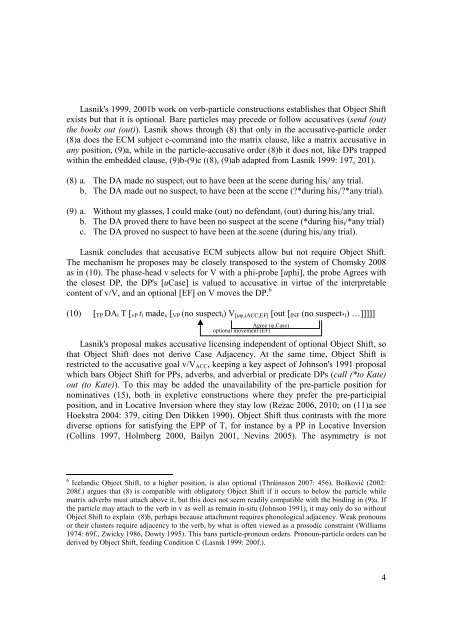Case Filter - UMR 7023 - CNRS
Case Filter - UMR 7023 - CNRS
Case Filter - UMR 7023 - CNRS
Create successful ePaper yourself
Turn your PDF publications into a flip-book with our unique Google optimized e-Paper software.
Lasnik's 1999, 2001b work on verb-particle constructions establishes that Object Shift<br />
exists but that it is optional. Bare particles may precede or follow accusatives (send (out)<br />
the books out (out)). Lasnik shows through (8) that only in the accusative-particle order<br />
(8)a does the ECM subject c-command into the matrix clause, like a matrix accusative in<br />
any position, (9)a, while in the particle-accusative order (8)b it does not, like DPs trapped<br />
within the embedded clause, (9)b-(9)c ((8), (9)ab adapted from Lasnik 1999: 197, 201).<br />
(8) a. The DA made no suspect i out to have been at the scene during his i / any trial.<br />
b. The DA made out no suspect i to have been at the scene (?*during his i /?*any trial).<br />
(9) a. Without my glasses, I could make (out) no defendant i (out) during his i /any trial.<br />
b. The DA proved there to have been no suspect at the scene (*during his i /*any trial)<br />
c. The DA proved no suspect to have been at the scene (during his i /any trial).<br />
Lasnik concludes that accusative ECM subjects allow but not require Object Shift.<br />
The mechanism he proposes may be closely transposed to the system of Chomsky 2008<br />
as in (10). The phase-head v selects for V with a phi-probe [uphi], the probe Agrees with<br />
the closest DP, the DP's [u<strong>Case</strong>] is valued to accusative in virtue of the interpretable<br />
content of v/V, and an optional [EF] on V moves the DP. 6<br />
(10) [ TP DA i T [ vP t i made v [ VP (no suspect i ) V [uφ,iACC,EF] [out [ INF (no suspect *i ) …]]]]]<br />
Agree (φ,<strong>Case</strong>)<br />
optional movement (EF)<br />
Lasnik's proposal makes accusative licensing independent of optional Object Shift, so<br />
that Object Shift does not derive <strong>Case</strong> Adjacency. At the same time, Object Shift is<br />
restricted to the accusative goal v/V ACC , keeping a key aspect of Johnson's 1991 proposal<br />
which bars Object Shift for PPs, adverbs, and adverbial or predicate DPs (call (*to Kate)<br />
out (to Kate)). To this may be added the unavailability of the pre-particle position for<br />
nominatives (15), both in expletive constructions where they prefer the pre-participial<br />
position, and in Locative Inversion where they stay low (Rezac 2006, 2010; on (11)a see<br />
Hoekstra 2004: 379, citing Den Dikken 1990). Object Shift thus contrasts with the more<br />
diverse options for satisfying the EPP of T, for instance by a PP in Locative Inversion<br />
(Collins 1997, Holmberg 2000, Bailyn 2001, Nevins 2005). The asymmetry is not<br />
6 Icelandic Object Shift, to a higher position, is also optional (Thráinsson 2007: 456). Bošković (2002:<br />
208f.) argues that (8) is compatible with obligatory Object Shift if it occurs to below the particle while<br />
matrix adverbs must attach above it, but this does not seem readily compatible with the binding in (9)a. If<br />
the particle may attach to the verb in v as well as remain in-situ (Johnson 1991), it may only do so without<br />
Object Shift to explain (8)b, perhaps because attachment requires phonological adjacency. Weak pronouns<br />
or their clusters require adjacency to the verb, by what is often viewed as a prosodic constraint (Williams<br />
1974: 69f., Zwicky 1986, Dowty 1995). This bans particle-pronoun orders. Pronoun-particle orders can be<br />
derived by Object Shift, feeding Condition C (Lasnik 1999: 200f.).<br />
4

















